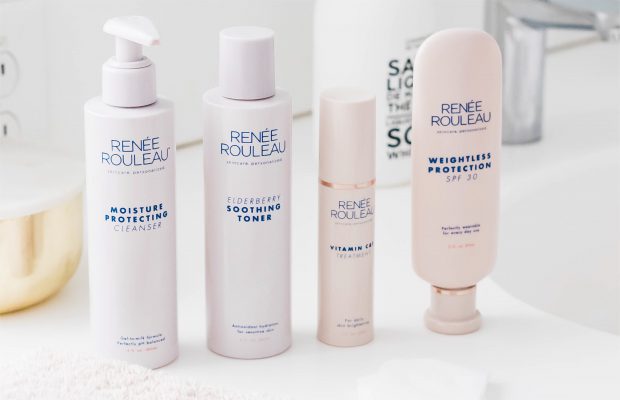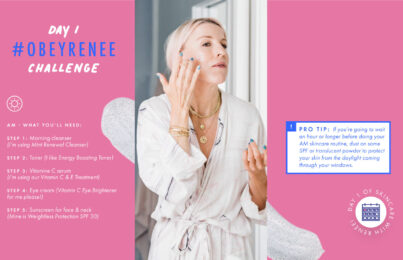Any time the seasons shift and there is a change in climate, it’s going to affect the way your skin behaves. That’s why it’s important to listen to your skin and make modifications to your routine as needed. Trust me—no matter your skin type, making some small, seasonal tweaks can make all the difference.
- What’s the Best Skincare Routine for Summer?
- 1. Use a Lighter Moisturizer
- 2. Use a Cleansing Lotion at Night
- 3. Use a Low-Foaming Cleanser in the Morning if You Have Oily Skin
- 4. Use a Pore-Cleaning Body Wash to Prevent Breakouts
- 5. Reapply Sunscreen Throughout the Day
- 6. Go Easy on Retinol and Exfoliating Acids Before Prolonged Sun Exposure
- 7. Load Up on Antioxidants
- 8. Use Soothing Products to Manage Heat-Induced Redness
Due to higher temperatures and increased sun exposure in summer, our skin is faced with everything from free radical damage to excess oil production and the appearance of brown spots, redness, and breakouts. That’s the bad news. The good news is that there are ways to prevent these issues altogether. Keep reading for my eight expert tips on creating an ideal summer skincare routine.
What’s the Best Skincare Routine for Summer?
1. Use a Lighter Moisturizer
In the winter, the air is dry, so your skin will have a harder time hanging on to moisture. That’s when a heavier moisturizer formula can come in handy. It can give your skin the extra oil it needs to lock in moisture. In the summer, though, humidity levels are higher, so your skin is naturally able to retain more moisture. In other words, it doesn’t need as much oil, so switching to a light, oil-free moisturizer, like Skin Recovery Lotion, can be helpful.
Your skin is also in need of water—not just oil. In fact, a good balance of water and oil is the key to calm, healthy-looking skin. In the summer, high temperatures can cause water to evaporate from your skin, which leaves it feeling tight and dehydrated. Using a lighter moisturizer is an easy way to boost hydration levels in your skin, so it feels plump and comfortable.
Another benefit of switching to a light, oil-free moisturizer in the summer months is that it can actually help extend the longevity of foundation and sunscreen (yes, really!). Oftentimes, the oils in heavier moisturizers can cause them to move, smudge, and even dissolve. That’s the last thing you want when your skin is being exposed to harmful UV rays!
2. Use a Cleansing Lotion at Night
Sunscreen (especially the water-resistant kind) can be the trickiest part of a summer skincare routine, especially if you’re prone to clogged pores. Add in sweat and excess oil production, and it may seem like breakouts are inevitable. Just know that using the right cleanser, and using it properly, is by far the best defense against summer breakouts.
I recommend using a cleansing lotion that contains lightweight emollients. This type of cleanser will do a better job of thoroughly removing sunscreen and makeup than a water-based cleanser. Here’s how to properly use a cleansing lotion to wash off sunscreen, makeup, sweat, and oil and to avoid clogged pores and breakouts:
- Massage the cleansing lotion onto dry skin for 60 seconds. This will break down sunscreen, makeup, and oil better than it would if you applied it to wet skin.
- Wet your fingertips and massage the skin one more time. Make sure you’re thorough and you get into all the nooks and crannies around your temples, jawline, and nose.
- Wipe a damp washcloth across your skin. This part is important. Gently wiping a washcloth across the skin will pick up and remove any last traces of sunscreen, makeup, sweat, or oil.
After you’ve finished cleansing your skin, you can continue with the rest of your routine. As an optional step, you can follow up with a deep-cleaning mask, such as the Rapid Response Detox Masque. It helps keep pores clear and is especially helpful if you’ve been wearing a lot of water-resistant sunscreen.
3. Use a Low-Foaming Cleanser in the Morning if You Have Oily Skin
If you’re wondering how to take care of oily skin in the summer, this tip is for you. While high-foaming cleansers are a no-go because they can strip the skin, using a gentle, low-foaming cleanser in the morning can be helpful, especially for oily skin types. These cleansers will clean deeply and cut through sweat and oil, setting you up with the perfect canvas for protective products to follow (like vitamin C serum and sunscreen).
When choosing a foaming cleanser to use in the morning, make sure it’s labeled ‘sulfate-free,’ such as Purifying Face Wash. If you choose to use a foaming cleanser in the morning, I still recommend using a cleansing lotion (like Vitamin-Infused Cleansing Emulsion) at night to do the heavy lifting when it comes to removing sunscreen and makeup.
4. Use a Pore-Cleaning Body Wash to Prevent Breakouts
When it comes to creating an ideal summer skincare routine, don’t forget to care for the skin on your body, too. In the summer, back and chest breakouts become more frequent. This is due to an increase in dead skin cell buildup, which happens after spending time in the sun. The dead skin cell buildup traps dirt, oil, and bacteria in the skin, which in turn causes breakouts.
One way to get ahead of this is to use the right body wash. I recommend using one with pore-cleaning ingredients like salicylic acid. Apply it to a loofah or washcloth and massage it over your back and body. This will exfoliate the skin, removing dead skin cells so your pores are less likely to become clogged in the first place. Regular exfoliation will also help keep your skin looking smooth and glowy, which is great when you’re showing more skin in the summer.
5. Reapply Sunscreen Throughout the Day
Excessive sun exposure can lead to DNA damage and premature signs of aging like lines, wrinkles, and loss of tone. It can also excite melanin cells and cause them to become overactive, leading to the appearance of brown spots and hyperpigmentation. While a generous application of sunscreen should always be the cornerstone of your skincare routine, one application isn’t enough. You should be reapplying it throughout the day to keep your skin protected.
For your regular day-to-day life, using a mineral sunscreen powder every 1.5 to 2 hours should suffice. If you’re going to the beach or spending time outside being active, I recommend continuing to layer on sunscreen lotion every 1.5 to 2 hours. You should also know that most makeup contains titanium dioxide, so you’re actually getting some sun protection from makeup too. It’s one of the reasons I recommend wearing makeup every day!
6. Go Easy on Retinol and Exfoliating Acids Before Prolonged Sun Exposure
Generally speaking, you don’t need to stop using retinol or exfoliating acids in your skincare routine during the summer. You can continue to use them regularly as long as you are diligent about daily sunscreen application. Remember, these ingredients can sensitize your skin and could make it more vulnerable to UV rays. Using them without sun protection is a big no-no.
That said, if you know you have an event coming up that will result in a lot of sun exposure (like a trip to the beach or a day spent outside at the pool), it’s best to pare back. Discontinue the use of any retinol or exfoliating acid product a week prior to the event. Then, pick them back up again two days after you’ve been in the sun. This should minimize the potential for irritation.
7. Load Up on Antioxidants
When you spend time outside, you’re being exposed to more free radical activity from the sun and pollution (especially if you live in a city). The best way to combat this is to load up on antioxidants—both through your diet and your skincare routine.
Eating a diet rich in fruits and vegetables is the best way to load up on antioxidants internally. Foods like tomatoes, spinach, watermelon, oranges, and blueberries are packed with immune-boosting antioxidants.
When it comes to your skincare routine, you should be using a vitamin C serum (like Vitamin C&E Treatment) every morning. Not only does vitamin C help neutralize damaging free radicals, but it can also help suppress melanin activity. This will help keep unwanted pigmentation under control.
I also recommend using antioxidants in your nighttime skincare routine. Think of your skin’s antioxidant supply as a tank of gas. Even if you apply an antioxidant serum in the morning, your tank is empty by the end of the day, especially if you’ve been spending time outside. Using something like the Renée Rouleau Firm + Repair Overnight Serum will restore your supply.
8. Use Soothing Products to Manage Heat-Induced Redness
Summer can be tough if you have sensitive skin and are prone to redness. When temperatures are high, your capillaries can dilate, which means more blood comes to the surface of the skin causing it to look pink or red. In some cases, it may also feel warm to the touch. When capillaries are constantly dilating and restricting from heat, they become stressed and can turn into “broken” capillaries.
You can avoid this by using products with soothing ingredients like chamomile, green tea, or oat kernel extract. Just as importantly, you should avoid harsh products, like those that contain high concentrations of essential oils or foaming sulfates.
I also recommend keeping your skincare products in the fridge, so that when you apply them, they’ll cool down the temperature of your skin. I don’t do this with all my products, but I will do it with gel-based products, such as Bio Calm Repair Masque.
So there you have it, these are my recommendations for an effective summer skincare routine. Bring on the barbecues and pool days—with loads of sunscreen and antioxidants!
Celebrity Esthetician & Skincare Expert
As an esthetician trained in cosmetic chemistry, Renée Rouleau has spent 35 years researching skin, educating her audience, and building an award-winning line of products. Her hands-on experience as an esthetician and trusted skin care expert has created a real-world solution — products that are formulated for nine different types of skin so your face will get exactly what it needs to look and feel its best. Trusted by celebrities, editors, bloggers, and skincare obsessives around the globe, her vast real-world knowledge and constant research are why Marie Claire calls her “the most passionate skin practitioner we know.”




Comments:
What should I do if I want to get a tan ?
How does my skincare routine should be if I really want to get a tan ?
Thanks
Posted By: Chema |
Great question! I think you’ll enjoy this post: https://blog.reneerouleau.com/expert-self-tanning-tips/?mc_cid=083d3b90c9&mc_eid=404dd570e1
Posted By: Ella Stevenson |
Great skin care tips for summer.
Thank you.
Posted By: Neora |